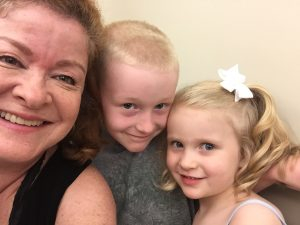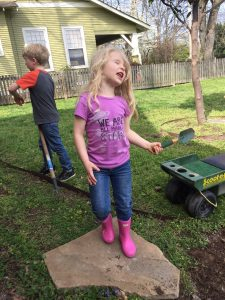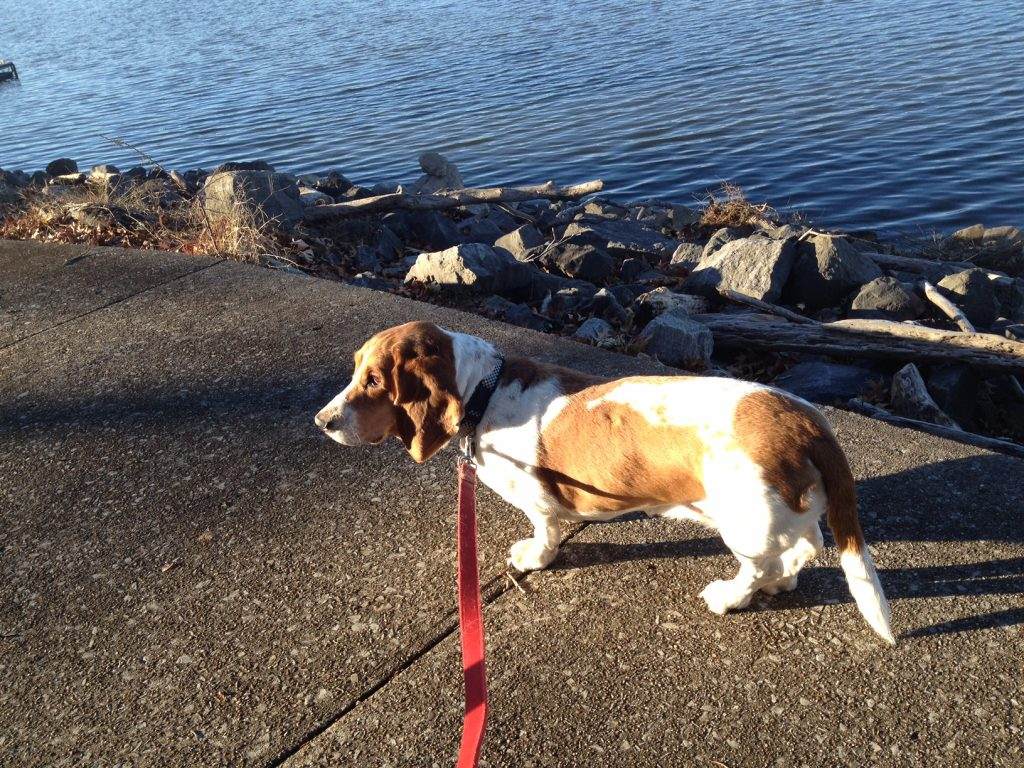
An alluring spring dawn had announced itself through the slats in the window blinds long before we raised our heads from the pillows simultaneously and locked eyes. No words were exchanged, but the message was clear. Keats would have observed us as two souls with but a single thought: It was too early to get up.
I’m not sure which of us dropped our head back to the pillow first. It might have been the dog, it might have been me. I didn’t wait to see if she would close her eyes again, because I knew that if I did, she would follow suit. Whenever possible, we prefer to linger prone on the soft surfaces—separate ones, mind you, we don’t share–in the early hours. We are not morning people.
We have been together a decade now, Madeline Basset* and I, that span representing the longest relationship I’ve sustained with someone who lives here, other than the time I raised my daughter. Our relationship has mellowed, as all enduring ones do, into a tapestry of shared joys balanced with loving tolerance and the occasional negotiated outright frustration. This many years in, I expend much less energy resolving the latter, often giving in in ways uncharacteristic of my general policy. Blatant misbehavior cannot be allowed, of course, but so many things are right on the edge, and after all, is compromise not the road to world peace? And like all good partnerships, there are ways in which we work just alike, and ways in which we balance each other out as opposites.
We love socializing, most of all with family but also with neighbors and friends, but we do not suffer lightly fools who misbehave, especially right in our faces. At such times, we have been known to bark in disapproval. We frequently disregard those who tell us what to do, even though we may appear to capitulate in the short term. We appreciate recognition, but are content not to be the center of attention. We love groups but also need our quiet time. We don’t like thunderstorms. Ever.
And yet the opposites reinforce the twosome. Overdrive is my default mode, unfortunately, while supreme relaxation and Zen-like repose are hers. A basset might be nature’s antidote for the restless and overwrought. Her exceptional talent in this regard once drew the loving sarcasm of my late father, who loved animals in his own way. Observing her curled up and snoring soundly on a corner of the couch during a loud family party, the house full of people, he whispered in my ear: “I’m worried about Madeline.” Oh, no! I said, failing to notice the glint in his eye. What’s wrong? “She’s exhibiting signs of a stress disorder,” he cracked.
Much has been written about the bond between humans  and the canines who join their lives to ours. I don’t pretend to understand the biology of it, but never doubt the intriguing facts that come along now and then. I once mentioned to a friend that that Madeline clearly knows who is at the door before they enter—the unidentifiable outsider gaining the deep guard-dog bark, the cherished friends and family naught but a wag of the tail and lick on the ankles. She had read they can hear human heartbeats, and perhaps that is an identifier?
and the canines who join their lives to ours. I don’t pretend to understand the biology of it, but never doubt the intriguing facts that come along now and then. I once mentioned to a friend that that Madeline clearly knows who is at the door before they enter—the unidentifiable outsider gaining the deep guard-dog bark, the cherished friends and family naught but a wag of the tail and lick on the ankles. She had read they can hear human heartbeats, and perhaps that is an identifier?
 Hounds, of course, possess discernment of scent that is far beyond human comprehension. Taking a walk requires one of those compromises I mentioned earlier; the nose drives all perceptions and actions, and some olfactory evidence, most of it at ground level, must be lingered over and studied. It seemed prudent to cease opposing this necessity long ago, so I christened our slow but steady forward progress The Hound Dog Shuffle. Often other dog owners walking the boundaries of our neighborhood will lap us, the quick ones more than once. The occasional passer-by, in the company of a canine of average height and a nose that is pointed forward instead of down, will observe this pattern with a smile and ask, “What is she doing?” My response: reading the day’s news.
Hounds, of course, possess discernment of scent that is far beyond human comprehension. Taking a walk requires one of those compromises I mentioned earlier; the nose drives all perceptions and actions, and some olfactory evidence, most of it at ground level, must be lingered over and studied. It seemed prudent to cease opposing this necessity long ago, so I christened our slow but steady forward progress The Hound Dog Shuffle. Often other dog owners walking the boundaries of our neighborhood will lap us, the quick ones more than once. The occasional passer-by, in the company of a canine of average height and a nose that is pointed forward instead of down, will observe this pattern with a smile and ask, “What is she doing?” My response: reading the day’s news.
Kind friends laugh away my acknowledgments of the old saw, that joke that we are naturally drawn to dogs that look like us. They might be too indulging to openly admit that a funny-looking dog with red hair, freckles, and remarkably short legs resemble any pal of theirs. Of the fact that I was nicknamed Stump by a rough-edged boss at my college part-time job, I say very little.
Looks aside, there can be no question that females who have achieved middle age and beyond soldier other challenges in common. We have bad knees, and don’t care much for steps anymore. Our ears require constant maintenance, hers for obvious reasons, mine to navigate my marked, inherited hearing impairment. Our bladders demand relief way more often than is convenient. The number of pill bottles in the cupboard is increasing.
Who knows what dogs understand about their lot in life? Probably more than we imagine. I hope she never wonders, as I so often do, how much more time we’ll have together. As the months roll inexorably on, we cope, we adjust, we change, we accommodate, staying close to the things we love most, managing everything else the best we can. I guess that’s what growing older is all about. We’re walking that path side-by-side, making it a little easier for each other as we go.
—————————————————————————————————————————————-
++I am often asked why I named a basset Madeline. She is the namesake of a young female character in the stories of legendary British humorist P.G. Wodehouse. The Madeline Bassett of Wodehouse fame was a soft-spoken, romance-babbling airhead who frightened practical-thinking men and was always getting entangled in the wrong relationship.

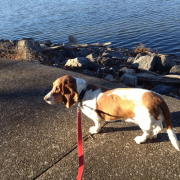
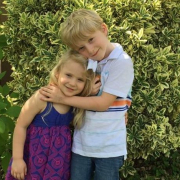

 The evening’s Injury Trifecta played itself out near dusk, when the day’s rain finally subsided and a fresh-air strategy was pursued with an eye toward burning energy before bedtime. We took the dog out for a walk, and a kindly neighbor stopped to meet the children and exchange pleasantries. When she complimented Sis’ eye-catching pink rain boots, Sis attempted to demonstrate, Gene Kelly-style, a few dance steps in a puddle. Sadly, these boots were not made for dancing. She caught one foot behind the other and took a rapid swan dive face down on the rough aggregate sidewalk.
The evening’s Injury Trifecta played itself out near dusk, when the day’s rain finally subsided and a fresh-air strategy was pursued with an eye toward burning energy before bedtime. We took the dog out for a walk, and a kindly neighbor stopped to meet the children and exchange pleasantries. When she complimented Sis’ eye-catching pink rain boots, Sis attempted to demonstrate, Gene Kelly-style, a few dance steps in a puddle. Sadly, these boots were not made for dancing. She caught one foot behind the other and took a rapid swan dive face down on the rough aggregate sidewalk.